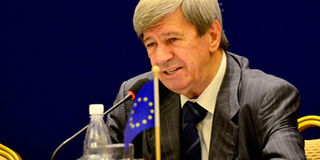European Union tells Uganda not to delay electoral reforms

Mr Eduard Kukan
What you need to know:
- Mr Museveni, who has been in power since 1986 emerged winner after garnering over 5.9 million votes against Dr Besigye's 3.5 million votes
Mr Kukan later hinted on his meeting with President Museveni and Dr Besigye. He said President Museveni and the government officials made some suggestions on what can be done to improve the electoral process in Uganda
The European Union Election Follow-up Mission to Uganda says it is important that authorities in the country improve the electoral process to ensue inclusive, transparent and credible elections.
The Follow-up Mission headed by European Union's Chief Election Observer in the 2016 elections, Mr Eduard Kukan, says the current question is not whether the reform is necessary, but rather how the reforms would be achieved.
Mr Kukan, a member of the EU Parliament, has been in the country since Monday to assess government’s progress in implementing recommendations on anomalies that were observed in the 2016 Presidential, Parliamentary and local government elections.
The EU Observer Mission in 2016 observed a number of shortcomings in the electoral processes. Some of the shortcomings include lack of transparency and independence of the Electoral Commission, lack of transparency in tallying and announcement of results and abuse of state resources and personnel for campaign purposes, among others.
It had identified eleven priority areas for reforms aimed at enhancing legitimacy and credibility of future elections in Uganda.
Mr Kukan told journalists in Kampala that while the reforms have not been achieved more than two years after the elections, his team was heartened to find that the recommendations in the 2016 final observation report had been disseminated across the institutions of state.
He said while there has virtually been no progress in the implementation of the recommendations, awareness of the proposals and the grounds thereof is a crucial first step.
Mr Kukan and his mission met President Yoweri Museveni and Attorney General William Byaruhanga, a number of civil society groups and former FDC President Dr Kiiza Besigye among others.
Dr Besigye came second in the presidential race that attracted eight candidates including the incumbent, President Museveni.
Value of mission
Mr Museveni, who has been in power since 1986 emerged winner after garnering over 5.9 million votes against Dr Besigye's 3.5 million votes.
The combined total for the other candidates, including former Prime Minister, Mr Amama Mbabazi, was less than 400,000 votes. Other candidates included Dr Abed Bwanika, Prof Venancius Baryamureeba, Gen. Benon Biraaro, Mr Joseph Mabirizi and Ms Maureen Kyalya.
The fact that the mission seemed satisfied with what government had informed it about the progress, however, attracted a barrage of critical questions from a number of journalists at the press conference.
While Mr Kukan and two of his members responded diplomatically, they seemed uncomfortable. Mr Kukan, at one moment almost lost it when more journalists seemed to question the value of the latest mission and its findings.
Mr Kukan later hinted on his meeting with President Museveni and Dr Besigye. He said President Museveni and the government officials made some suggestions on what can be done to improve the electoral process in Uganda.
While the assurances were made, Mr Kukan did not reveal whether the government had suggested any road map towards implementing the EU Observer Mission recommendations as well as the August 2016 Supreme Court directives to the Attorney General on the required electoral reforms.



